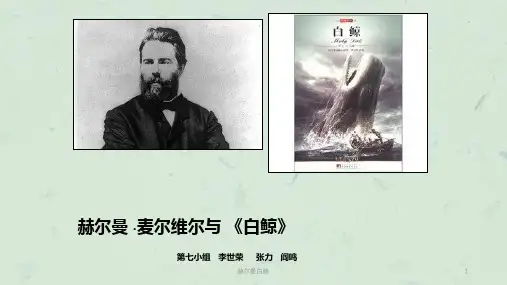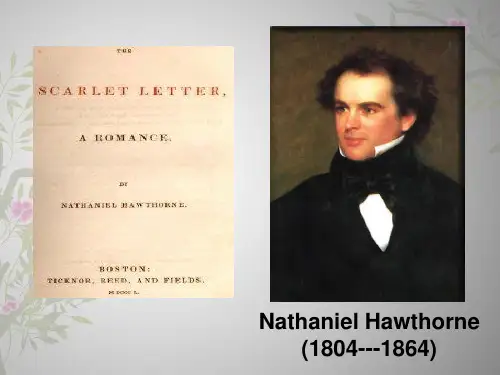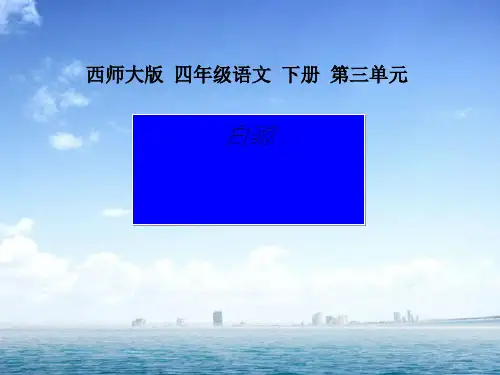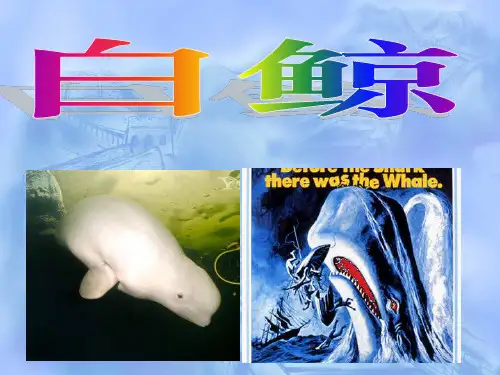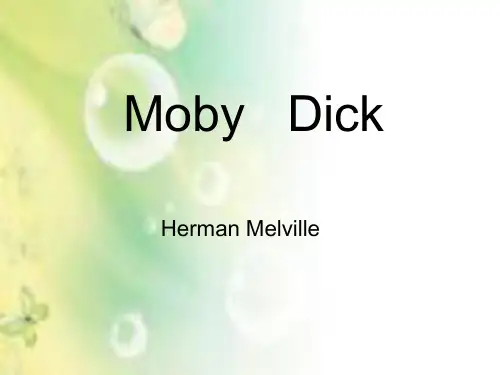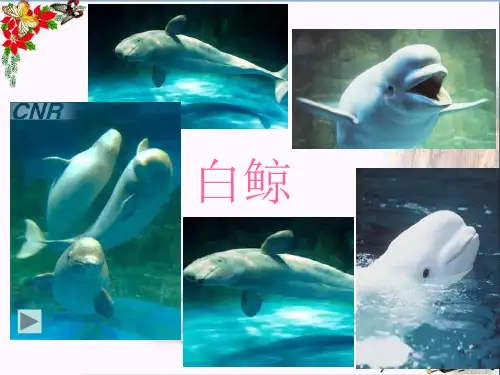美国文学选读之白鲸PPT课件
- 格式:ppt
- 大小:759.00 KB
- 文档页数:46
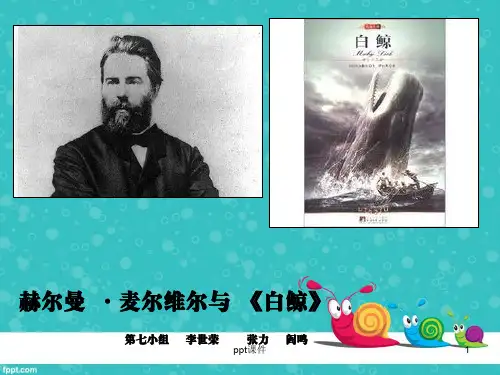

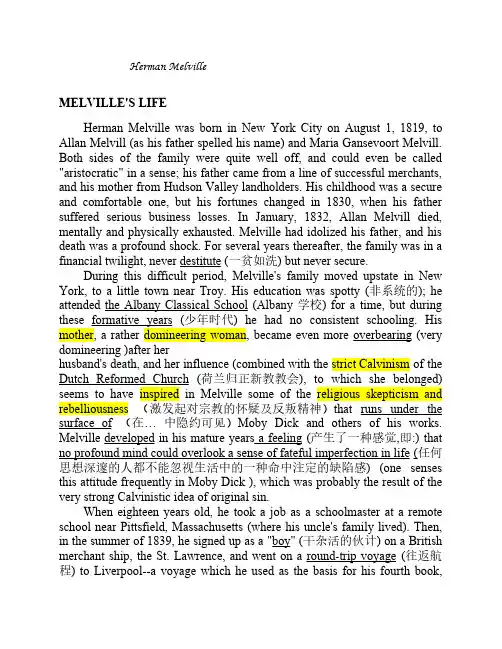
Herman MelvilleMELVILLE'S LIFEHerman Melville was born in New York City on August 1, 1819, to Allan Melvill (as his father spelled his name) and Maria Gansevoort Melvill. Both sides of the family were quite well off, and could even be called "aristocratic" in a sense; his father came from a line of successful merchants, and his mother from Hudson Valley landholders. His childhood was a secure and comfortable one, but his fortunes changed in 1830, when his father suffered serious business losses. In January, 1832, Allan Melvill died, mentally and physically exhausted. Melville had idolized his father, and his death was a profound shock. For several years thereafter, the family was in a financial twilight, never destitute (一贫如洗) but never secure.During this difficult period, Melville's family moved upstate in New York, to a little town near Troy. His education was spotty (非系统的); he attended the Albany Classical School (Albany 学校) for a time, but during these formative years (少年时代) he had no consistent schooling. His mother, a rather domineering woman, became even more overbearing (very domineering )after herhusband's death, and her influence (combined with the strict Calvinism of the Dutch Reformed Church (荷兰归正新教教会), to which she belonged) seems to have inspired in Melville some of the religious skepticism and rebelliousness (激发起对宗教的怀疑及反叛精神)that runs under the surface of (在… 中隐约可见)Moby Dick and others of his works. Melville developed in his mature years a feeling (产生了一种感觉,即:) that no profound mind could overlook a sense of fateful imperfection in life (任何思想深邃的人都不能忽视生活中的一种命中注定的缺陷感) (one senses this attitude frequently in Moby Dick ), which was probably the result of the very strong Calvinistic idea of original sin.When eighteen years old, he took a job as a schoolmaster at a remote school near Pittsfield, Massachusetts (where his uncle's family lived). Then, in the summer of 1839, he signed up as a "boy" (干杂活的伙计) on a British merchant ship, the St. Lawrence, and went on a round-trip voyage (往返航程) to Liverpool--a voyage which he used as the basis for his fourth book,Redburn(1849). This trip began for the young Melville a period of almost five years of traveling around the world that gave him the material for his first several books,, including Moby Dick (《白鲸记》).Upon returning to the United States after the St. Lawrence voyage, Melville again taught school for a while, but evidently he had developed a love for the sea. For in January, 1841, he signed on the whaler Acushnet(与捕鲸船Acushnet签约) for a trip to the South Seas. Life aboard the whaler repelled (使…厌倦,反感)Melville, however, and in July, 1842, he and another seaman, Richard Greene ("Toby" in the novel Typee)(小说《泰比》中人物Toby的原型) deserted ship (开小差,不辞而别)at the Marquesas Islands ( 马克萨斯群岛). He lived for a month with a cannibal tribe (食人肉部落)which treated him well but would not let him go. Then he escaped on an Australian whaler, the Lucy Ann, which he abandoned (溜走)at Tahiti. (塔希提岛) There he worked for a time as a field laborer (干临时农活的短工) and eventually left on another whaler (搭乘捕鲸船离开), the Nantucket ship (Nantucket 岛的名为… 的捕鲸船)Charles and Henry, which arrived at the Hawaiian Islands (夏威夷群岛) in April, 1843. The adventures of these months in the Marquesas and Tahiti were the materials out of which Melville later shaped (成为… 的素材) Typee (1846) and Omoo ((欧穆,1847). At Hawaii Melville signed up as a seaman on an American warship, the United States, which returned him to America. He was dismissed in October of 1844, and returned home to begin writing.He published Typee and Omoo , and then, in 1849, a book called Mardi (《玛地》), a confused and difficult allegorical novel (寓言型小说) which repelled many of the readers who had so enjoyed his first two books. (Mardi is today often considered the first in a trilogy (三部曲) which also includes Moby Dick and Pierre《皮埃尔》.) Later in 1849 came the above-mentionedRedburn, and in 1850 Meiville published White-Jacket 《白外衣》, a book based on his experiences on the Man-of-War United States (名为Man-of-War 的美国军舰). These firstfive books won him considerable reputation (which he later repudiated (对上述名誉拒不接受); in a letter to Hawthorne he ironically lamented (以讥讽的语气哀叹道)that he seemed doomed to be accepted only as "a man-who had lived among the cannibals"). He became a member of the influential New York literary group (颇有影响的纽约文学社)led by the Duyckinckbrothers, and for a time was lionized (被尊为盟主). In 1849 he traveled to England to arrange for foreign publication of his works, and in 1850 he moved to a farmhouse near Pittsfield, Massachusetts, where he lived for the next thirteen years with his wife (Elizabeth Shaw, whom he married in 1847) and children.During his first year at his home, which he named "Arrowhead, "(他为这座房子命名为“箭头”)Melville met Nathaniel Hawthorne, and the two men, sensing that they had much in common, struck up a friendship. It was a singularly fortunate association (与…结交是件难得的幸事)for Melville, even though it was a truly personal one only for about two years. He read Hawthorne's works avidly (如饥似渴地), and was given encouragement by Hawthorne's interest (霍桑对该书的兴趣给了他很大鼓励) precisely during the period in which he was writing his masterpiece, Moby Dick. As a result of his high esteem (高度敬仰) for Hawthorne, Melville dedicated (题献) Moby Dick to him when it appeared in late 1851.The critical reaction to Moby Dick was mixed, but tended to be negative, especially as time passed. That Melville himself seems to have felt that the book had failed is clear from his next novel, Pierre (1852) 作者本人似乎也觉得Moby Dick是个败笔, 这点可以清楚地从他的下一本书中看到, an iconoclastic book (谴责性的著作) which angrily attacks, among other things , publishing practices (愤怒抨击了出版界的种种恶习). Pierre, like Moby Dick, embodies a quest for truth (体现了对真理的追求), but it was condemned as obscure (被指责为晦涩难懂), and its use of incest and suicide (其中的乱伦与自杀的描写) caused it to be attacked as immoral as well. Melville's reputation was by this time definitely on the decline. In the next several years, he produced Israel Potter (《依斯瑞尔﹒波特》,1855), The Piazza Tales(《广场故事》,1855), and The Confidence-Man(《骗子》,1857), an extremely interesting but difficult moral allegory (劝戒性质的寓言小说)which takes place on a Mississippi River steamboat. He fell more and more in debt (债台愈筑愈高)during these years, and in 1856, suffering from what would be called a nervous breakdown (精神崩溃)today, went on a tour of the Holy Land (圣地巴勒斯坦)which restored him from his state of mental exhaustion.In 1863 he sold his home and moved to New York City, and in 1866, after years of seeking a government job, he finally secured a minor position in the New York customs house. The same year he published Battle Pieces《战争诗篇》and Aspects of the War《战争所见》 (the best poetry on the American Civil War except for Whitman's Drum Taps惠特曼的《哀鼓》). Ten years later, in 1876, he published Clarel ,《克拉瑞尔》 a long, reflective narrative poem (反思性叙事长诗)about the problems of religious faith (宗教信仰问题). Two more books of poems were published in his lifetime: John Marr and Other Sailors (《约翰﹒玛尔和其他水手》,1888) and Timoleon(《梯摩里昂》,1891). These last three volumes of poetry were privately financed (自费印刷发行)and printed in small editions. Melville finished the manuscript of Billy Budd(《毕利﹒伯德》)in 1891, but this work was not published until 1924. He died on September 28, 1891, so completely obscure (默默无闻)that many were surprised to discover that he had not beendead for years.BRIEF SUMMARY OF MOBY DICKMoby Dick is told by a man who identifies himself only as Ishmael. Impelled by an urge to see more of the world and understand more of its mysteries, Ishmael decides to go to sea. He leaves New York and travels to New Bedford, Massachusetts, where he spends a night with a South Seas cannibal (食人生番)named Queequeg as a roommate. At first frightened by Queequeg, Ishmael soon finds him likeable enough.While at New Bedford, Ishmael goes to a famous whaleman's chapel (捕鲸水手常去的教堂)whose pastor (牧师), Father Mapple, is widely known in the whaling fleet (捕鲸船队). Father Mapple preaches a sermon (做布道)which focuses on the story of Jonah and the whale(约拿与鲸鱼), in which he emphasizes that man must reject his own pride (远离自傲)and be true to God, letting no other force guide him. Ishmael and Queequeg become fast friends at New Bedford, and decide to go to Nantucket Island and sign on the same whaleship together. They take a packet boat (搭乘一条班船), and on the trip to Nantucket, Queequeg saves an obnoxious lout (智商低下的人)from drowning in the icy waters. (This is the first of a number of scenes in which men are saved from drowning. )At Nantucket, Queequeg tells Ishmael that his god has decided that Ishmael must choose the ship on which they will sail, and Ishmael chooses the Pequod because it is so picturesque (外表漂亮). Both men sign on, and are told that the ship's captain is Ahab, an unusual man but onewho "has his humanities. " (有自己独特的人情味) He is confined at his home because of some mysterious sickness, so Ishmael cannot see him. As Ishmael and Queequeg leave the ship they are accosted by (有人向他们打招呼)a queer old man who drops dark hints about Ahab (暗示了Ahab种种神秘).The ship sails on a cold, gray Christmas day. As the two men approach the Pequod, they see a group of shadowy figures board the ship before them (看到一伙模模糊糊的人影在前面上了船). The ship plunges out into the Atlantic and for many days nothing is seen of Ahab. Ishmael presents the three mates (三位高级船员,大副,二副和三副), Starbuck, Stubb, and Flask, then the harpooners (标枪手), and then describes the crew in general. The ship sails down the Atlantic into a warmer climate, and Ahab finally makes an appearance. As time passes, Ahab appears more frequently, usually standing in one of two holes (通常站在后甲板的两处有洞的地方之一)drilled on the quarter-deck for his peg leg of whalebone (那两个洞是为了方便他固定他那条用鲸骨做的假肢钻的). A scene between Ahab and the second mate (二副), Stubb, shows that something is disturbing Ahab profoundly.Ishmael tells the reader something of whales, categorizing them according to size and type, and showing why he considers the sperm whale the noblest of all (抹香鲸最高贵). He also begins to give us what proves ultimately to be an immense amount of information about whales, whaling (捕鲸行动), whaleships, and whalemen. Then comes the first "big scene"(大场面)of the book-- Ahab calls all the crew onto the quarter-deck, and tells them that he has sworn to hunt to the death the great whale (发誓至死也要捕杀巨鲸), Moby Dick, that ripped his leg off (咬掉他一条腿)on his last voyage. He inflames the crew (激起船员的斗志)so that except for Starbuck, the first mate (大副), they are all eager to pursue Moby Dick; and he nails a gold doubloon (金币)to the mainmast (主桅杆), promising it as a reward for the first man to sight Moby Dick on the voyage.Ishmael sets himself to find out as much as he can about this whale, and discovers that, besides being unusually large and deformed in certain ways (躯体非同一般), Moby Dick has a savage temper which has led him to destroy many a whaleboat and kill a number of seamen. He is so ferocious (凶猛)that he seems, unlike ordinary whales, to know what he is doing,and to destroy boats and men with conscious malice (有意识地进行毁灭). Most frightening of his characteristics, however, is his whiteness, which is mysterious.As the Pequod moves down the South Atlantic, around the Cape of Good Hope (好望角), and across the Indian Ocean, Ahab spends night after night with his charts and maps (航海图和地图), tracing on them courses (在图上标出可能遇上Moby Dick 的航线)on which he might stand the best chance of meeting Moby Dick. Ishmael continues to fill us in on details of whales and whaling. Several times whales are sighted and chased; at the first lowering (首次降下捕鲸艇时)it is discovered that Ahab has a special boat crew (手里有一伙特殊的船员), led by a Satanic Oriental (恶魔般的东方人)named Fedallah--this stowaway boat crew (这伙偷乘的船员)explains the mysterious figures (就是那群神秘的身影)Ishmael saw when boarding the ship. The Pequod also meets or has significant contact with nine other vessels in the course of the voyage (the Goney, Town-Ho, Jeroboam, Jungfrau, Bouton-de-rose, Samuel Enderby, Bachelor, Rachel, and Delight ). Each one of these ships, by contrast or parallel to the Pequod (与Pequod号类同或不同), gives us new information or a slightly different attitude toward Ahab's ship and his quest. And along with all this, we get Ishmael's constant reflections (反思)as the philosophical narrator continually examines his experiences and tries to fathom (试图探求) what they mean and where they are leading (其经历对未来的影响).As the Pequod sails across the Pacific, Ahab becomes ever more intense in his desire to destroy Moby Dick. He asks each one of the ships he encounters, "Hast seen the White Whale?”, but it is only when he sails the ship down to the equator that he finally meets a ship which has seen Moby Dick. In the meantime, Pip, a little Negro youth, has been temporarily abandoned in the sea, and has lost his mind before being saved by the ship. Touched by Pip's plight (状况), Ahab has taken special care of him, keeping him in his cabin. Pip begs Ahab several times to abandon his quest for the White While, but Ahab, though deeply moved, continues the search.The suspense of the hunt builds (捕鲸的悬念由于…而更为强烈) throughout several weeks. The ship meets the Samuel Enderby, whose captain has recently lost his arm to Moby Dick. Ahab cracks his ivory leg (碰裂了鲸骨假腿) leaving the Enderby, and must have a new one made by theship's carpenter. The Pequod runs into a typhoon (热带风暴), during which the mastheads glow with a mysterious electrical fire (桅杆顶端发出了神秘的电光). In a weird ritual (神秘的仪式), Ahab claims to be a son of the fire and lightning (宣称自己是这火与电之子), and challenges nature to do its worst to him (向大自然宣战,不怕其把最糟糕的事情降临在自己头上). Finally the ship meets two whalers, the Rachel and the Delight, which have just had battles with Moby Dick. Despite dire warnings (不顾会遇到不测的警告), Ahab presses the chase furiously, and the tension mounts (气氛紧张起来). One last quiet day dawns; Starbuck tries his utmost to convince Ahab that the quest is folly, but Ahab feels that his acts have been foreordained since eternity (他的追捕行为命中注定), and cannot turn back. On the following day Ahab himself sights Moby Dick, thus (ironically) gaining his own promised reward.The first day the boats approach Moby Dick, but he dives (潜入水下) and, coming up under Ahab's boat, bites it in half (把小船咬成两半). The Pequod sails up (捕鲸船驶上前来) , drives the whale off, and picks up all its boats (把放下的小船都收回来) ; then the ship follows the whale. On the second day, all three whaleboats get harpoons into Moby Dick (把标枪都投到了大鲸身上), but he fights furiously; two boats are smashed (被咬碎) and Ahab's is overturned (Ahab的小船被掀翻). All are saved except Fedallah (who has predicted that Ahab's death would be preceded by certain signs 预言Ahab 死前会有一些征兆, among which was to be Fedallah's own death).On the third day Ahab harpoons the whale (投掷标枪刺中大鲸), but is left to fight him alone when the other two boats, damaged, are forced to return to the Pequod. Moby Dick breaks loose from (挣脱开小船) Ahab's boat, turns, and dashes his immense forehead into the Pequod's bow(船头). The crushed boat (撞坏的船) sinks. As it settles, Ahab darts one last hapoon into Moby Dick, but the line catches him around the neck (标枪绳缠住脖子) and he is dragged down into the sea. The vortex (巨大旋涡) created by the sinking ship pulls down everything (把所有一切都拖到海底) except one lone survivor---Ishmael. He is rescued by the Rachel, which is still cruising the area (搜寻在附近海面) looking for survivors from its previous encounter with Moby Dick. And the sea rolls on (波涛滚滚) as it did thousands of years ago.MOBY DICKSELECTION IIn the two excerpts given here, the great chase is ending and we are close to the conclusion of the book. The Pequod has finally sighted Moby-Dick. The boats have been lowered in pursuit of the whale, which has already smashed two of them.Chapter 135 THE CHASE –THIRD DAY (追击 –第三天)Whether fagged (疲倦) by the three days' running chase, and the resistance to his swimming (阻碍了它的游速) in the knotted hamper he bore (身上所缚的纠缠在一起的绳索); or whether it was some latent deceitfulness and malice in him (怀有奸诈和恶意): whichever was true, the White Whale's way now began to abate (放缓) , as it seemed, from the boat so rapidly nearing him once more; though indeed the whale's last start had not been so long a one as before (那鲸的冲劲不象以前一样持久). And still as Ahab glided over the waves (冲过波涛划过船去) the unpitying sharks accompanied him; and so pertinaciously stuck to the boat (顽固地盯住小船); and so continually bit at the plying oars (不住地咬着划桨), that the blades became jagged and crunched (桨叶变得参差不齐) , and left small splinters in the sea, at almost every dip (每划动下,就会在海面上留下一些碎片)."Heed them not (别管它们)! those teeth but give new rowlocks to your oars (那些牙齿会给你的划桨作出新桨架来). Pull on (接着划) ! 'tis the better rest, the sharks' jaw than the yielding water (鲨鱼的嘴巴比这种软绵绵的海水厉害).""But at every bite, sir, the thin blades grow smaller and smaller!""They will last long enough! pull on!--But who can tell" --he muttered (喃喃自语道)--"whether these sharks swim to feast on the whale or on Ahab?--But pull on! Aye, all alive, now—we near him. The helm (掌舵的) ! take the helm (掌住舵)! let me pass,"--and so saying, two of the oarsmen helped him forward to the bows of the still flying boat (扶着他到这如飞的船头去).At length as the craft was cast to one side (小船冲到一边), and ran ranging along with the White Whale's flank (与白鲸齐头并进), he seemed strangely oblivious of its advance (未注意到有船冲上来) --as the whale sometimes will-- and Ahab was fairly within the smoky mountain mist (进入蒙蒙的雾气中), which, thrown off from the whale's spout (这是白鲸喷水口中喷出的迷雾), curled round 'his great Monadnock hump (盘旋在Monadnock山峰般的鼓鼓的脊梁上); he was even thus close to him; when, with body arched back 身体向后一仰), and both arms lengthwise high-lifted to the poise (双臂直直地高举), he darted his fierce iron (投出了凶猛的标枪), and his far fiercer curse (更加凶狠的咒骂)into the hated whale. As both steel and curse sank to the socket (陷进鲸的眼窝), as if sucked into a morass (被吸入泥潭), Moby Dick sidewise writhed (向斜处一扭身); spasmodically rolled his nigh flank against the bow (紧靠船头的胁腹猛地一滚) , and, without staving a hole in it (并未给小船撞出孔洞), so suddenly canted the boat over (使小船翻了个身), that had it not been for the elevated part of the gun wale to which he then clung (如果没有紧紧抓住翘起的船舷), Ahab would once more have been tossed into the sea. As it was, three of the oarsmen-- who foreknew not the precise instant of the dart (不知在何时应投出标枪), and were therefore unprepared for its effects--these were flung out (被翻了出去); but so fell, that, in an instant two of them clutched the gun- wale again (又抓住船舷), and rising to its level on a combing wave (随着一个浪峰浮出水面), hurled themselves bodily inboard again (身体一晃又翻进了船舱); the third man helplessly dropping astern (落水到了船尾), but still afloat and swimming.Almost simultaneously, with a mighty, volition of ungraduated, instantaneous swiftness (以毅然决然的意志和迅猛速度), the White Whale darted through the weltering sea (在波涛汹涌的大海里冲撞起来). But when Ahab cried out to the steersman (舵手) to take new turns with the line, and hold it so (抓住新的机会撒出绳索,把绳索抓紧); and commanded the crew to turn round on their seats (就地转身), and tow the boat up to the mark (把小船向目的物拽去); the moment the treacherous line felt that double strain and tug (捣蛋的绳索因为受到加倍的紧拉和拖拽), it snapped in the empty air (在半空中迸断了)!"What breaks in me (我身体中什么断啦)? Some sinew cracks (什么筋断裂了)!--'tis whole again (一切完整呀); oars! oars! Burst in upon him (向它划过去)!"Hearing the tremendous rush of the sea-crashing boat (劈波斩浪的小船), the whale wheeled round to present his blank forehead at bay (大鲸转身,抬起大额头来招架); but in that evolution (在转身中), catching sight of the nearing black hull of the ship (捕鲸船的黑壳船身); seemingly seeing in it the source of all his persecutions (似乎看清了捕鲸船是迫害它的罪魁);bethinking it--it ,nay be--a larger and nobler foe (更大和更有力量的仇敌); of a sudden, he bore down upon its advancing prow (猛扑向冲上来的捕鲸船船头), smiting his jaws amid fiery showers of foam (在泡沫阵中乱咬起来).Ahab staggered (忧郁起来); his hand smote his forehead (手敲着额头). "I grow blind (我看不见啦) ; hands (伸过手来)! stretch out before me that I may yet grope my way (摸索着行动). Is't night (现在是夜里吗)?""The whale! The ship!" cried the cringing (畏畏缩缩的) oarsmen."Oars! oars! Slope downwards to thy depths (到海底逃命吧) , O sea that ere it be for ever too late, Ahab may slide this last, last time upon his mark (最后一次溜到目标那儿去)! I see: the ship! the ship! Dash on, my men! will ye not save my ship?"But as the oarsmen violently forced their boat through the sledge-hammering seas (拼命使小船冲过大铁锤似的波涛时), the before whale-smitten bow- ends of two planks burst through (刚被大鲸咬过的船头板豁开了), and in an instant almost, the temporarily disabled boat lay nearly level with the waves (); its half-wading, splashing crew (半身浸在水里), trying hard to stop the gap and bale out the pouring water (堵住裂口,把滔滔涌进的海水舀出去)SELECTION IIIn this second excerpt the characters not named before are from the Pequod: Stubb, the second mate and Tashtego, the Indian harpooner (标枪手) with his symbolic hammer. Ahab kills the white whale but all the human beings involved, except the narrator, die in the process. At the end only nature, symbolized by the sea, remains, moving but unmoved.Chapter 135 , concludedMeantime, for that one beholding instant (可以一下子看到), Tashtego's mast-head hammer (要在桅杆顶钉旗子的锤子)remained suspended (suspend: hold,as if hanging)in his hand; and the red flag, half-wrapping him as with a plaid (一半裹着他的身体,就像穿着一件格子呢的衣服), then streamed itself straight out from him (从他身上飘了出去), as his own forward-flowing heart ( 就像他那颗向前飘去的心); while Starbuck and Stubb, standing upon the bowsprit beneath (在第一斜桅杆下面), caught sight of the down-coming monster (从下面冲上来的庞然大物)just as soon as he."The whale, the whale! Up helm (转舵向风), up helm! Oh, all ye sweet powers of air (你们这些可爱的空气之主啊), now hug me close (把我紧紧抱住)! Let not Starbuck die, if die he must (如果他非死不可), in a woman's fainting fit (像个女人那样昏死过去吧). Up helm, I say--ye fools, the jaw (看那张大嘴)! the jaw ! Is this the end of all my bursting prayers? all my life-long fidelities?(难道我喊破喉咙的祷告,终生的虔诚,就是这结果?) Ah, Ahab, Ahab, 1o, thy work (这就是你干出来的). Steady! helmsman, (要从容,舵手!) steady. Nay, nay! Up helm again! He turns to meet us! Oh, his unappeasable brow drives on towards one (它那压抑不住愤怒的额头朝向一个目标), whose duty tells him he cannot depart (它不能离开那目标). My God, stand by me now( 上帝,与我同在呀)!""Stand not by me, but stand under me (听我指挥), whoever you are that will now help Stubb (无论是谁都要帮助斯塔布); for Stubb, too, sticks here (斯塔布也在这里坚持着). I grin at thee (嘲笑你), thou grinning whale! Who ever helped Stubb, or kept Stubb awake, but Stubb's own unwinking eye ( 眨都不眨的眼睛)? And now poor Stubb goes to bed upon a mattress that is all too soft (要躺到那张再软也没有的大床上去了); would it were stuffed with brushwood (那里会不会塞着些木柴呢)! I grin at thee, thou grinning whale! Look ye, sun, moon, and stars (我看着你们,太阳…)! I call ye assassins of as good a fellow as ever spouted up his ghost (我称呼你们,与称呼那个始终在喷出它的鬼影的家伙一样,都叫凶犯). For all that (尽管如此), I would yet ring glasses with thee (与你们碰杯), would ye but hand the cup (你们就举起杯吧)! Oh, oh, oh, oh! thou grinning whale, but there'll be plenty of gulping soon (一会儿,你就会狼吞虎咽啦)! Why fly ye not (为何不逃), O Ahab! For me, off shoes and jacket to it (如果是我的话,就会脱掉鞋子,脱光衣服逃掉); let Stubb die in his drawers (死在他的橱柜里吧)! A most mouldy and over salted death (死在海里,又深又咸) , though;--cherries(红樱桃酒)! Cherries! Cherries! Oh, Flask, for one red cherry ere we die (我们死之前,喝杯红樱桃酒吧)!""Cherries? I only wish that we were where they grow (我只希望我们现在是在长着樱桃的地方). Oh, Stubb, I hope my poor mother's drawn my part-pay ere this; if not, few coppers will now come to her, for the voyage is up." (我希望我可怜的母亲会在我死前领走我的股金,不然的话,就拿不到几个钱, 因为航程已经结束了)From the ship's bows (船头), nearly all the seamen now hung inactive (呆呆地挂在船头); hammers, bits of plank, lances, and harpoons, mechanically retained in their hands (锤子,木板片捕鲸枪,标枪都木然地攥在手里) just as they had darted fcom their various employments (就像他们从各自的活计中猛然停了下来) ; all their enchanted eyes intent upon the whale (着了魔似的眼睛都盯住大鲸), which from side to side strangely vibrating his predestinating head (奇怪地晃动着那能够左右命运的大头), sent a broad band of over spreading semicircular foam before him (在身前喷出一大串半圆型的雾沫) as he rushed. Retribution, swift vengeance, eternal malice were in his whole aspect (它的整体外观就是报复,急于复仇和无限的恶毒) and spite of all that mortal man could do (无论人类的全部能力), the solid white buttress of his forehead smote the ship’s starboard bow (坚硬得拱架般的白色额头拼命冲撞船的右舷), till men and timbers reeled (船上的人与船板都晃了起来). Some fell flat upon their faces. Like dislodged trucks, the heads of the harpooners aloft shook on their bull-like necks (像脱了节的车头一样,标枪手们的头在公牛般的脖子上晃来晃去). Through the breach, they heard the waters pour (听到裂口出涌进的海水声), as mountain torrents down a flume (像山洪奔进水槽).“The ship! The hearse! – the second hearse (第二只棺架)!” cried Ahab from the boat; “ its wood could only be American (那木材只能是美国产的)!”Diving beneath the settling ship (潜到停住的大船的底下), the whale ran quivering along its keel (船龙骨); but turning under water, swiftly shot to the surface again, far off the other bow (在船的另一头出现) , but within a few yards of Ahab’s boat, where, for a time, he lay quiescent(静静地浮在水面上).“I turn my body from the sun. What ho, Tashtego! Let me hear thy hammer. Oh! Ye three unsurrendered spires of mine (你们三人是我不退缩的先锋); thou uncracked keel (不碎的龙骨); and only god-bullied hull (唯一的神慌鬼怕的船壳); thou firm deck (坚韧的甲板), and haughty helm (骄傲的船舵), and Pole-pointed prow (指向北极的船头), -- death-glorious ship (由于殉职而荣光的)! Must ye then perish, and without me (撇掉了我而毁灭)? Am I cut off from the last fond pride of meanest ship-wrecked captains (连最起码的破船船长的荣誉也得不到吗)? Oh, lonely death on lonely life! Oh, Now I feel my topmost greatness lies in my topmost grief (至高无上的伟大寓于无边的悲伤中). Ho,ho! From all your furthest bounds (所有的波涛), pour ye now in, ye bold billows of my whole foregone life (我整整一生经历过的浪涛), and top this one piled comber of my death (在我垂死的浪涛上在加上一层吧)! Towards thee I roll (我要滚向你那边), thou all-destroying but unconquering whale; to the last I grapple with thee (我要与你扭斗到底); from hell’s heart O stab at thee; for hate’s sake I spit my last breath at thee. Sink all coffins and all hearses to one common pool(让所有的棺材和棺架都沉到一口水塘里吧)! And since neither can be mine (什么都不是我的), let me then tow to pieces, (让我把一切都拖得粉碎) while still chasing thee though tied to thee (虽然与你捆在了一起), thou damned whale! Thus, I give up the spear (不用捕鲸枪了)!”The harpoon was darted; the stricken whale flew forward; with igniting velocity the line ran through the groove (标枪像着了火一般,飞速穿过细槽); -- ran foul (缠到了一起). Ahab stooped to clear it (弯腰去解绳索); he did clear it; but the flying turn caught him round the neck (如飞的绳圈套住他的脖子), and voicelessly as Turkish mutes bowstring their victim (像一声不响地把他们的罪犯吊死的), he was shot out of the boat (像弹丸般从小船上弹了出去) ere the crew knew he was gone (在场的水手们都不知道他被绞死了). Next instant, the heavy eye-splice in the rope’s final end flew out of the stark-empty tub (沉重的绳索尾部的索眼从空了的索桶里猛地窜出) , knocked down an oarsman, and smiting the sea, disappeared in its depths (撞进了海里,沉到了海底).For an instant, the tranced (惊呆的) boat's crew stood still; then turned. "The ship? Great God, where is the ship?" Soon they through dim, bewildering mediums saw her sidelong fading phantom (透过昏暗的令人迷茫的雾气,看到倾斜的大船影子渐渐消失) , as in the gaseous Fata Morgana (就像虚幻的海市蜃楼中的情景), only the uppermost masts out of water (仅有几根桅杆顶部露出水面); while fixed by infatuation, or fidelity, or fate, to their once lofty perches (或是出于恋恋不舍之情,或是出于忠诚,抑或命运决定的), the pagan harpooners still maintained their sinking look-outs on the sea(坚持在下沉的了望岗位上). And now, concentric circles (一个旋涡) seized the lone boat itself, and all its crew, and each floating oar, and every lance-pole (所有的捕鲸枪棒), and spinning, animate and inanimate (有生命的和无生命的), all round and round in one vortex (旋涡), carried the smallest chip of the Pequod out of sight.But as the last whelmings intermixingly (最后几股打旋的洋流) poured themselves over (混在一起倒在了) the sunken head of the Indian at the mainmast (主桅顶上印地安人沉下去的头颅), leaving a few inches of。
